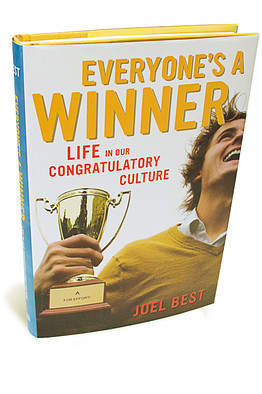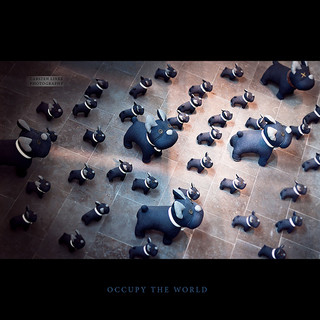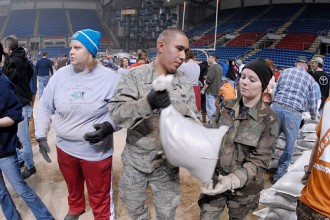
Has there ever been a culture as obsessed with competitions and awards as ours? And what better way is there to get someone’s time and attention than by giving them an award—especially if that someone is in a resource-poor, status-driven field like academia?
The obvious answers to questions like these are, at least in part, why we started our monthly TSP media awards for excellence in reporting of social scientific research and insight. We were also inspired and informed by a great friend of TSP (and recent contributor) Joel Best’s recent book Everyone’s a Winner: Life in our Congratulatory Culture (University of California Press, 2011). Well, it turns out Professor Best has just been honored with an award himself. Today he’s taking the opportunity to provide The Society Pages with an insider’s, reflexive account of the experience winning. In honor of his honor, please enjoy “Status Affluence Strikes Home” by our award-winning guest contributor, Joel Best:
A few weeks ago, I learned that I’d won a prize—a pretty big prize, actually. Each year, my university singles out one professor for his or her scholarly accomplishments, so it’s a real honor to be chosen as this year’s recipient. It’s also a bit ironic: in 2011, I published Everyone’s a Winner: Life in our Congratulatory Culture, a book about prize proliferation and status affluence. Now winning an award has taught me a bit more about prize processes.
To begin, I was struck that getting the word out is a very important part of the awarding a prize. While intelligence services may award medals in secret, at least until their spies come in from the cold, most prizes are heavily publicized. I gave an interview for the university’s website; the resulting story will be reprinted in the alumni magazine. I was asked to attend a meeting of our board of trustees, where the provost listed dozens of faculty who received honors—being chosen as fellows of learned societies, all-campus awards for outstanding teaching and advising, and so on. After he finished, the winners were asked to stand and we received a nice round of applause. My dean also asked me to participate in an all-college awards ceremony (our college has its own awards for faculty who excel in research, teaching, advising, or service). As the word got out, I received lots of congratulatory emails.
Obviously, this recognition was personally gratifying, but I wasn’t the only beneficiary. Publicizing professors who receive awards serves the campus, the college, even their departments; awards confirm that all of these entities are centers of meritorious accomplishments. Award ceremonies are moments of Durkheimian social solidarity, a reaffirmation of shared values and a claim that those values are embodied in those being recognized. Universities award and publicize lots of prizes, not just because the winners deserve recognition, but as a way of convincing everyone associated with the institution (and that certainly includes alumni who might be moved to further contribute to their alma mater) that it is worthy of their support.
When you think about it for a moment, you realize that our culture awards a colossal number of prizes. Think about all the Boy Scout merit badges, the employee-of-the-month plaques, and such; Americans must receive millions of awards each year. And, at least some of the time, there’s grumbling, such as when people don’t agree that this year’s winner should have received the Academy Award for Best Picture. When I left that board of trustees meeting, some people were muttering that the great majority of the faculty recognized—probably at least three-quarters—came from engineering or the natural sciences, while faculty in the humanities were barely mentioned.
The fact the people care about these matters, that news of prizes can make them grumpy, reminds us how little attention contemporary sociologists pay to status. Look at the index to any introductory textbook, and count the number of entries for race, class, gender, and power. Now look up status. Status has become the Cinderella of sociological concepts, ignored, dismissed, taken for granted. Now examine your college’s website, probably filled with news of the respect, honor, and other sign of status the students and faculty have received. Isn’t it at least possible that, when we ignore status, we’re missing something important?
I want to mention one other topic related to the organization of prizes. An individual has to be nominated to receive the prize I was awarded. I have a colleague who tells me that, not all that long ago, someone could submit a single letter extolling a colleague plus the individual’s vita, and that could be enough to lead to the award being given. No more. Today there is a call for nominations that includes a list of rules and deadlines. My chair and that same colleague made heroic efforts to contact all sorts of people to request supporting letters, then assembled a thick packet of these materials (I haven’t seen it, but if anyone reading this sent a letter in my behalf, thanks so much). Obviously, there can’t be a single standard of merit that ranks people who have made very different contributions; this means that a highly organized effort in a nominee’s behalf improves that person’s chances of being chosen. This also helps explain why engineers and natural scientists seem to receive so many awards; their professional associations seem to offer more opportunities to receive high-status honors, including medals, being named a fellow in a professional organization, and such. (Compare the highly selective Sociological Research Association, which carefully draws next to no attention to itself, presumably as a means of avoiding controversy in a discipline where many members are anti-elitist). The distribution of awards reflects the organization and cultures of myriad social worlds, where members may choose to celebrate one another’s accomplishments.
Obviously, I was very pleased to receive my prize. But, if the sociological lens is a useful tool for viewing the world, we shouldn’t be afraid to direct it toward ourselves, to recognize the social forces and social patterns that shape our own lives.
Joel Best is a professor of sociology and criminal justice at the University of Delaware. He’s the author of, among many others, Everyone’s a Winner, The Stupidity Epidemic, and Damned Lies and Statistics. Best was recently interviewed about the new edition of Social Problems on TSP’s Office Hours podcast.






